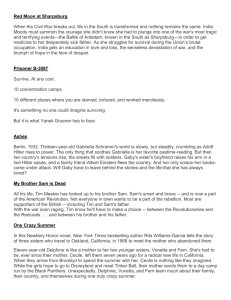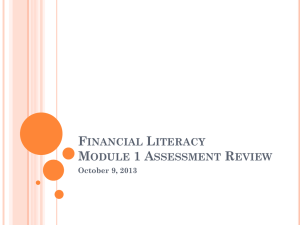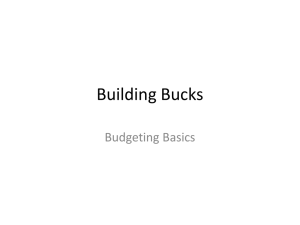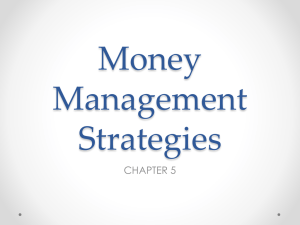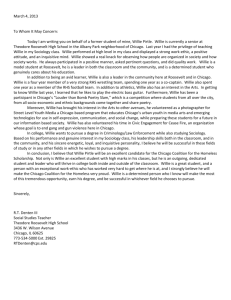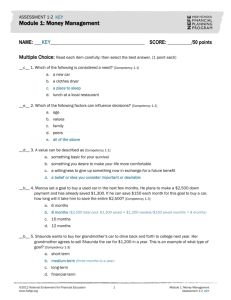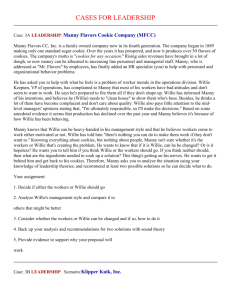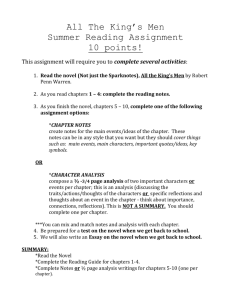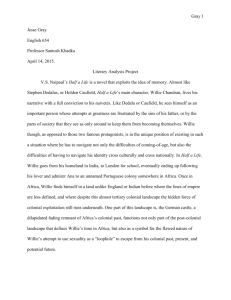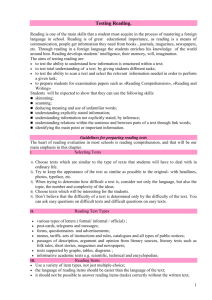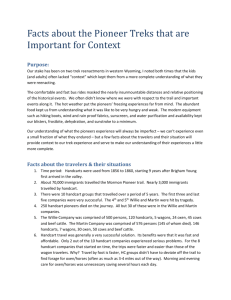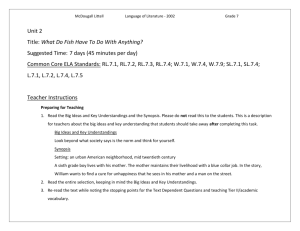ASSESSMENT 1-2 Module 1: Money Management
advertisement
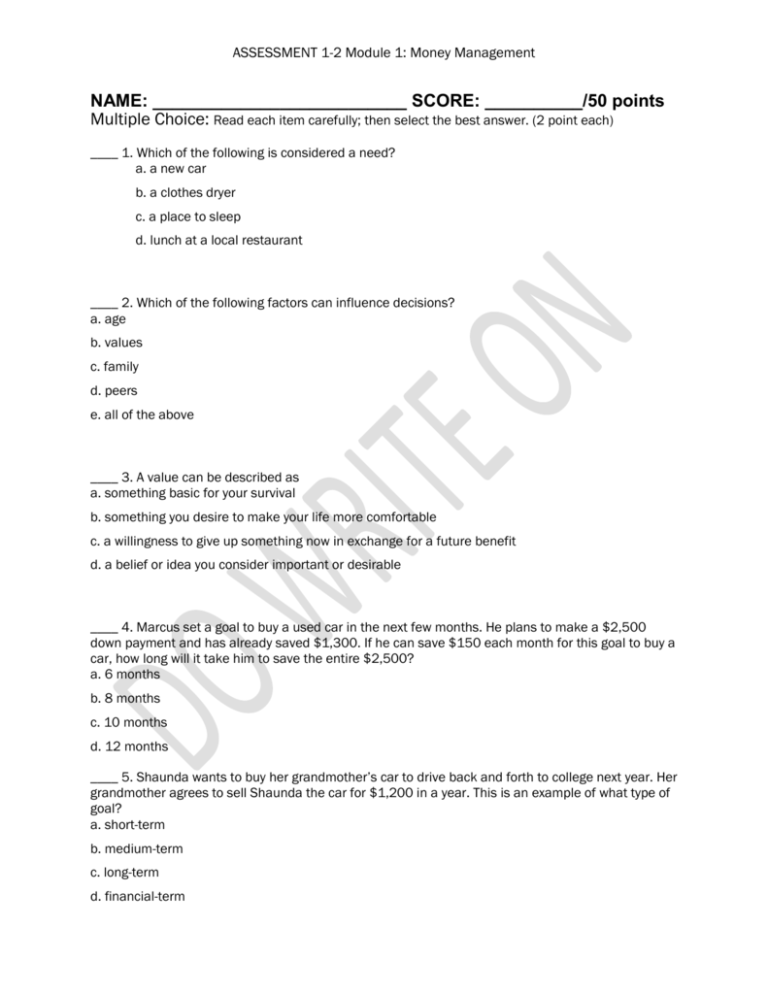
ASSESSMENT 1-2 Module 1: Money Management NAME: __________________________ SCORE: __________/50 points Multiple Choice: Read each item carefully; then select the best answer. (2 point each) ____ 1. Which of the following is considered a need? a. a new car b. a clothes dryer c. a place to sleep d. lunch at a local restaurant ____ 2. Which of the following factors can influence decisions? a. age b. values c. family d. peers e. all of the above ____ 3. A value can be described as a. something basic for your survival b. something you desire to make your life more comfortable c. a willingness to give up something now in exchange for a future benefit d. a belief or idea you consider important or desirable ____ 4. Marcus set a goal to buy a used car in the next few months. He plans to make a $2,500 down payment and has already saved $1,300. If he can save $150 each month for this goal to buy a car, how long will it take him to save the entire $2,500? a. 6 months b. 8 months c. 10 months d. 12 months ____ 5. Shaunda wants to buy her grandmother’s car to drive back and forth to college next year. Her grandmother agrees to sell Shaunda the car for $1,200 in a year. This is an example of what type of goal? a. short-term b. medium-term c. long-term d. financial-term ASSESSMENT 1-2 Module 1: Money Management ____ 6. Lisa will buy two new car tires three months from now before taking a long trip. Each tire costs $75. How much will Lisa need to save each month to reach her goal? a. $25 b. $50 c. $75 d. $150 ____ 7. In eight months, Kelly’s parents will need to make the final payment for Kelly’s braces. Half of the total cost was paid when her braces were put on. The total cost is $3,200. How much will Kelly’s parents need to save each month to pay off the balance owed? a. $135 b. $200 c. $400 d. $1,600 ____ 8. Mark wants to visit his foreign exchange “brother” who lives in Brazil. He’d like to make the trip 18 months from now, right after graduation. Mark estimates that he will need $3,000 total to pay for transportation, food, and other expenses. He has already saved $300. How much will Mark need to save each month to reach his goal? a. $150 b. $167 c. $225 d. $2,700 Willie’s Weekly Spending Log Gave a friend $5 gas money for rides to and from school Purchased a used video game, $14 Bought two bus day passes, $1.25 each Case Study: Read about Willie’s situation. Use this data and what you have learned about money management to respond to Questions 9-14. Willie is 15-year-old student who works a few hours on weekends at the local ice cream shop. One day he asks his mom for money to see to a movie with his friends. His mom replies, “Willie, what do you do with your paycheck money? You shouldn’t need to ask me for more money each week.” Willie decided to write down how he spent his money last week. He also listed money he received during the week. Look at his list and answer the questions below. ___ 9. What was Willie’s income during the week? (2 point) a. $5.00 b. $57.00 c. $62.00 d. $123.50 ASSESSMENT 1-2 Module 1: Money Management ____ 10. What was the total of Willie’s expenses during the week? (2 point) a. $44.25 b. $61.50 c. $66.50 d. $106.25 11. Willie doesn’t want to ask his mom for money next week if he is short on cash. Recommend one way that Willie can change his spending or income so he isn’t spending more than he is receiving. (2 points) _____________________________________________________________________________________ _____________________________________________________________________________________ _____________________________________________________________________________________ _____________________________________________________________________________________ Matching: Read each statement carefully. a. Cash Flow Select the term that best matches the statement by writing the letter of the matching term in the blank. (2 points each). ____ 12. Any money you receive such as an allowance or paycheck ____ 13. A predictable amount of money spent to buy something or do something that is the exact same amount every time ____ 14. Saving a certain amount of money to be used later for financial goals ____ 15. Giving up the next best choice when making a decision ____ 16. Setting aside money to have on hand for unexpected expenses and events b. Emergency Fund c. Fixed Expense d. Income e. P.Y.F f. Opportunity Cost g. Spending and Saving Plan h. Spending Log i. Variable Expenses Budget Plan: Jeff is a senior in high school. He earns $10 per hour working approximately 30 hours a week at Staples. An estimated 20% of his paycheck is deducted for taxes. He gets paid weekly. Jeff also earns $20 each month for helping his grandparents with chores. He has a small mutual fund that earns about $200 each quarter, but he reinvests his money into the account and doesn’t claim it as income. Jeff has a car loan and pays $300 per month. He pays Room and Board (rent) to his parents in the amount of $100 a month. He is responsible for the following expenses for the month: Cell phone Gas for Car Auto Insurance NetFlix $45 $60 $75 $15 ASSESSMENT 1-2 Module 1: Money Management Jeff plays video games on his Xbox and buys songs for his IPod. He pays for his clothes by himself and likes to eat out at least 3 times per week at fast food restaurants. He has a girlfriend and they go out to the movies, bowling, and do other things together. One of Jeff’s short term goals is to go to Florida during Spring Break in March. He needs $300 for his trip and has already saves $200. How much does he need to save in the remaining 2 months for his trip. He is constantly saving for college, where he plans on going to Ohio State in the Fall of 2013. Any extra money he can spare he uses for this intermediate goal. Create monthly spending plan (budget) using the information provided. Use the blank spending plan on the computer labeled Jessica’s Budget Blank to build the plan.
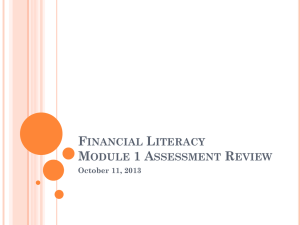

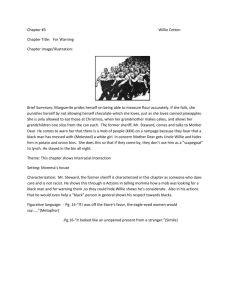
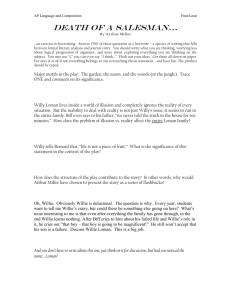

![What_do_Fish_Have_to_Do_with_Anything[1]](http://s3.studylib.net/store/data/006629434_1-a00b1e75dfb71b3f93ad5805d2caa648-300x300.png)
